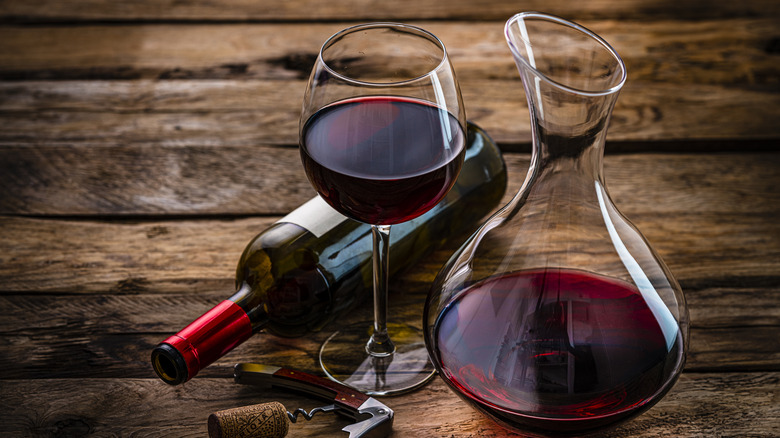Can You Put Wine In A Whiskey Decanter?
When we talk about decanters, most folks picture those crystal bottles you see in movies, often placed decoratively on CEOs' coffee tables. These whiskey decanters aren't just eye candy. They also serve a practical purpose by helping the liquor inside breathe and "open up." But here's the interesting part: Decanters can work with wine just as well as whiskey!
Wine decanters typically have a long neck, an open top, and a rounded base, somewhat resembling a flower vase. The expanded base offers more surface area for the wine to aerate. On the other hand, whiskey doesn't require as much aeration as wine, so whiskey decanters are extremely diverse in design — from a classic, square-cut bottle shape to a unique skull shape. But the most significant difference has to be the inclusion of a stopper in a whiskey decanter. Once stopped, you can keep whiskey in a decanter indefinitely. On the other hand, because wine doesn't do well in decanters and can go bad within days, they typically don't come with such a device.
But what if you only have a whiskey decanter and want to decant wine? It can still work, although it'll take longer for the wine to air out compared to using a wine decanter because of the smaller surface area. But generally speaking, using a whiskey decanter won't harm your wine. Just make sure to clean the decanter thoroughly before pouring your wine in, so you don't end up with hints of Kentucky Bourbon in your Bordeaux!
How exactly does decanting help improve the flavor of wine?
When wine mingles with the air, two things happen to it: oxidation and evaporation. Oxidation smooths out the wine's flavors and teases out hidden flavors and aromas that might otherwise remain concealed. On the flip side, evaporation can help you deal with any unwanted smells in the bottle. Sulfites, for example, which are used to keep wine fresh, can give the wine a rotten egg-like smell. Luckily, a bit of air can whisk away that funk and help the wine's true aroma "bloom."
Decanting also helps you avoid sediment, which is common in older wines. Sediment won't harm you, but no one likes finding grit in their glass. It's like stumbling upon coffee grounds in your morning cup — not enjoyable. By carefully pouring your wine into a decanter, you can separate the sediment and leave it behind, resulting in a smoother and visually pleasing sip.
Now, here's a pro tip: Be mindful of how long you decant your wine. White wines should only stay in the decanter for five to 15 minutes. Older reds can linger a bit more, perhaps up to 30 or 60 minutes. And for those robust, tannin-rich wines like Barolo, you might want to give them up to 3 hours to mellow and reach their peak flavor!

